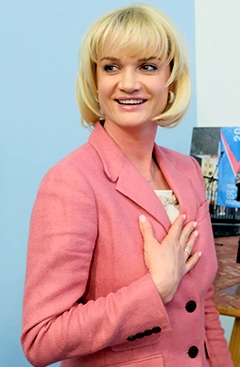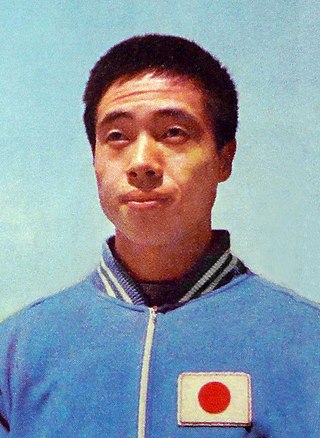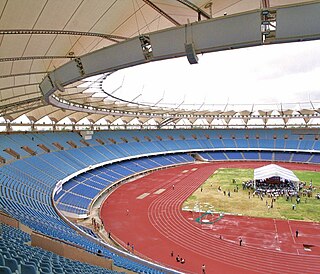
Artistic gymnastics is a discipline of gymnastics in which athletes perform short routines on different types of apparatus. The sport is governed by the Fédération Internationale de Gymnastique (FIG), which assigns the Code of Points used to score performances and regulates all aspects of elite international competition. Within individual countries, gymnastics is regulated by national federations such as British Gymnastics and USA Gymnastics. Artistic gymnastics is a popular spectator sport at many competitions, including the Summer Olympic Games.

Svetlana Vasilyevna Khorkina is a retired Russian artistic gymnast. She competed in three Summer Olympics: 1996 Summer Olympics, 2000 Summer Olympics, and 2004 Summer Olympics. During her career, Khorkina won seven Olympic medals and twenty World Championship medals. Over time, she medaled in every event at the World Artistic Gymnastics Championships. She was also the first gymnast to win three all-around titles at the World Championships and only the second female artistic gymnast ever, after Nadia Comăneci, to win three European All-Around titles. Khorkina is regarded as one of the most successful female gymnasts of all time.

At the 1980 Summer Olympics, fourteen different artistic gymnastics events were contested, eight for men and six for women. All events were held at the Sports Palace of the Central Lenin Stadium in Moscow from July 20 through 25th. Several teams who had qualified to compete were absent as a result of the 1980 Summer Olympics boycott, including the United States, Canada, China, Japan, South Korea, and West Germany.
Ri Se-gwang is a retired North Korean artistic gymnast, representing the April 25 Sports Club. He is often considered a specialist on vault apparatus in the sport of men’s artistic gymnastics (MAG).

Kōhei Uchimura is a retired Japanese artistic gymnast. He is a seven-time Olympic medalist, winning three golds and four silvers, and a 21-time World medalist.

The men's vault competition was one of eight events for male competitors in artistic gymnastics at the 1988 Summer Olympics in Seoul. The qualification and final rounds took place on September 18, 20 and 24th at the Olympic Gymnastics Hall. There were 89 competitors from 23 nations, with nations competing in the team event having 6 gymnasts and other nations having up to 3 gymnasts. The event was won by Lou Yun of China, the second man to successfully defend an Olympic title in the vault and fourth man to win two medals of any color in the event. Sylvio Kroll of East Germany took the silver medal, while Park Jong-hoon of South Korea earned his nation's first men's vault medal with his bronze.

The men's individual all-around competition was one of eight events for male competitors in artistic gymnastics at the 1972 Summer Olympics in Munich. The qualification and final rounds took place on 27, 29 and 30 August at the Sports Hall. There were 113 competitors from 26 nations. Each nation could send a team of 6 gymnasts or up to 3 individual gymnasts. The event was won by Sawao Kato of Japan, the third man to successfully defend an Olympic title in the event; it was Japan's third consecutive victory in the event. The Japanese gymnasts swept the medals, with Eizo Kenmotsu earning silver and Akinori Nakayama. Kato and Nakayama, who had also taken bronze in 1968, were the eighth and ninth men to win multiple medals overall in the event. It was the first medal sweep in the event since France did it in the first edition in 1900. This broke the Soviet Union's five-Games medal streak, with their best gymnast finishing fourth.

The men's parallel bars competition was one of eight events for male competitors in artistic gymnastics at the 1972 Summer Olympics in Munich. The qualification and final rounds took place on August 27, 29 and September 1 at the Olympiahalle. There were 112 competitors from 26 nations ; nations entering the team event had 6 gymnasts while other nations could have up to 3 gymnasts. Japan reached the height of its success in the event this year: putting four men into the six-man final and sweeping the medals. Sawao Kato earned Japan's third consecutive gold medal in the parallel bars, tying Switzerland for most golds all-time; Kato would break that tie in 1976 with his second gold medal. Shigeru Kasamatsu took silver while Eizo Kenmotsu earned bronze.

The men's vault competition was one of eight events for male competitors in artistic gymnastics at the 1960 Summer Olympics in Rome. It was held on 5, 7, and 10 September at the Baths of Caracalla. There were 129 competitors from 28 nations, with nations in the team competition having up to 6 gymnasts and other nations entering up to 2 gymnasts. For the second straight Games, there was a tie for first place in the vault. Boris Shakhlin of the Soviet Union and Takashi Ono of Japan each received a gold medal. It was the third consecutive Games with a gold medal for the Soviets. Ono, who had taken bronze in 1952, became the second man to win multiple vault medals. Third place and the bronze medal went to Soviet Vladimir Portnoi.

The men's vault competition was one of eight events for male competitors in artistic gymnastics at the 1956 Summer Olympics in Melbourne. It was held from 3 to 7 December at the Melbourne Festival Hall. There were 63 competitors from 18 nations, with nations in the team competition having up to 6 gymnasts and other nations entering up to 3 gymnasts. The event was won by Helmut Bantz of the United Team of Germany and Valentin Muratov of the Soviet Union, who tied for the top place. Soviet Yuri Titov finished third to win the bronze medal.

The 2002 Asian Games was a multi-sport event held in Busan, South Korea from September 29 to October 14, 2002. Busan was the second South Korean city to host the Games, after Seoul in 1986. A total of 6,572 athletes—4,605 men and 1,967 women—from 44 Asian National Olympic Committees (NOCs) participated in 38 sports divided into 419 events. The number of competing athletes was higher than the 1998 Asian Games, in which 6,544 athletes from 41 NOCs participated. It was the first time in the history of the Asian Games that all 44 member nations of the Olympic Council of Asia (OCA) participated in the Games. Afghanistan returned after the fall of the Taliban government in the midst of ongoing war; East Timor, newest member of the OCA made its debut; and North Korea competed for the first time in an international sporting event hosted by South Korea. Both nations marched together at the opening ceremony with a Korean Unification Flag depicting the Korean Peninsula as United Korea.

The 1982 Asian Games [a] was a multi-sport event held in Delhi, India, from 12 November to 4 December 1982. A total of 3,411 athletes from 33 National Olympic Committees (NOCs) participated in these games, competing in 147 events in 21 sports and 22 disciplines. The number of participating countries was the greatest in Asian Games history. Sport events of handball, equestrian, rowing and golf were included for the first time; while fencing and bowling were excluded. This medal table ranks the participating NOCs by the number of gold medals won by their athletes.

The 1998 Asian Games was a multi-sport event held in Bangkok, Thailand from December 6 to December 20, 1998. A total of 6,544 athletes from 41 Asian National Olympic Committees (NOCs) participated in these games, competing in 376 events in 36 sports. This edition of the Games marked the addition of three sports—squash, rugby union and cue sports—to the list of Asian Games sports; squash was included after seven years of lobbying by the Asian Squash Federation.

The 1974 Asian Games was a multi-sport event held in Tehran, Iran from September 1, 1974, to September 16, 1974. This was the first time that Asian Games were celebrated in any Middle East country. A total of 3,010 athletes selected from 25 Asian National Olympic Committees participated in 16 sports divided into 202 events. The number of participating countries was the greatest in Asian Games history, eighteen nations competed in Bangkok, host of the 1970 Asian Games. Fencing, gymnastics (artistic) and women's basketball were included for the first time; while sailing—which made its debut in the previous Asian Games—was not included, however since 1978, sailing is a part of the Asian Games sports.

Phan Thị Hà Thanh is a retired Vietnamese artistic gymnast from Haiphong and a two-time Olympian. She is currently the most decorated and successful gymnast from Vietnam on the international stage. She became the first gymnast to win a world medal for Vietnam, capturing the bronze on vault at the 2011 World Artistic Gymnastics Championships.

Oleg Yuriyovych Verniaiev is a Ukrainian artistic gymnast. He is the 2016 Olympic parallel bars champion and individual all-around silver medalist. Verniaiev is also the 2014 World parallel bars champion, the 2015 European individual all-around champion and the 2017 European individual all-around champion.
Kelly Jay Simm is an English artistic gymnast. She is the 2015 Summer Universiade all-around champion, vault silver medalist, and floor bronze medalist. She represented England at the 2014 Commonwealth Games and won a gold medal in the team final. She competed at the 2015 World Championships and she won the bronze medal with the team.

Artem Olegovich Dolgopyat is an Israeli artistic gymnast who specializes in the floor exercise.

The men's vault event at the 2020 Summer Olympics was held on 24 July and 2 August 2021 at the Ariake Gymnastics Centre. Unlike the other apparatus events, vault requires gymnasts to perform two exercises in order for results to count towards the vault final; most of the gymnasts perform only one or none. Approximately 20 gymnasts from 15 nations competed two vaults in the qualifying round.
Yeo Seo-jeong is a South Korean artistic gymnast. She is the 2020 Olympic bronze medalist, the 2023 World bronze medalist, the 2018 Asian Games champion, and the 2022 Asian champion on vault. She is the first South Korean female gymnast to win an Olympic medal and also the first to win a World Championships medal.

















